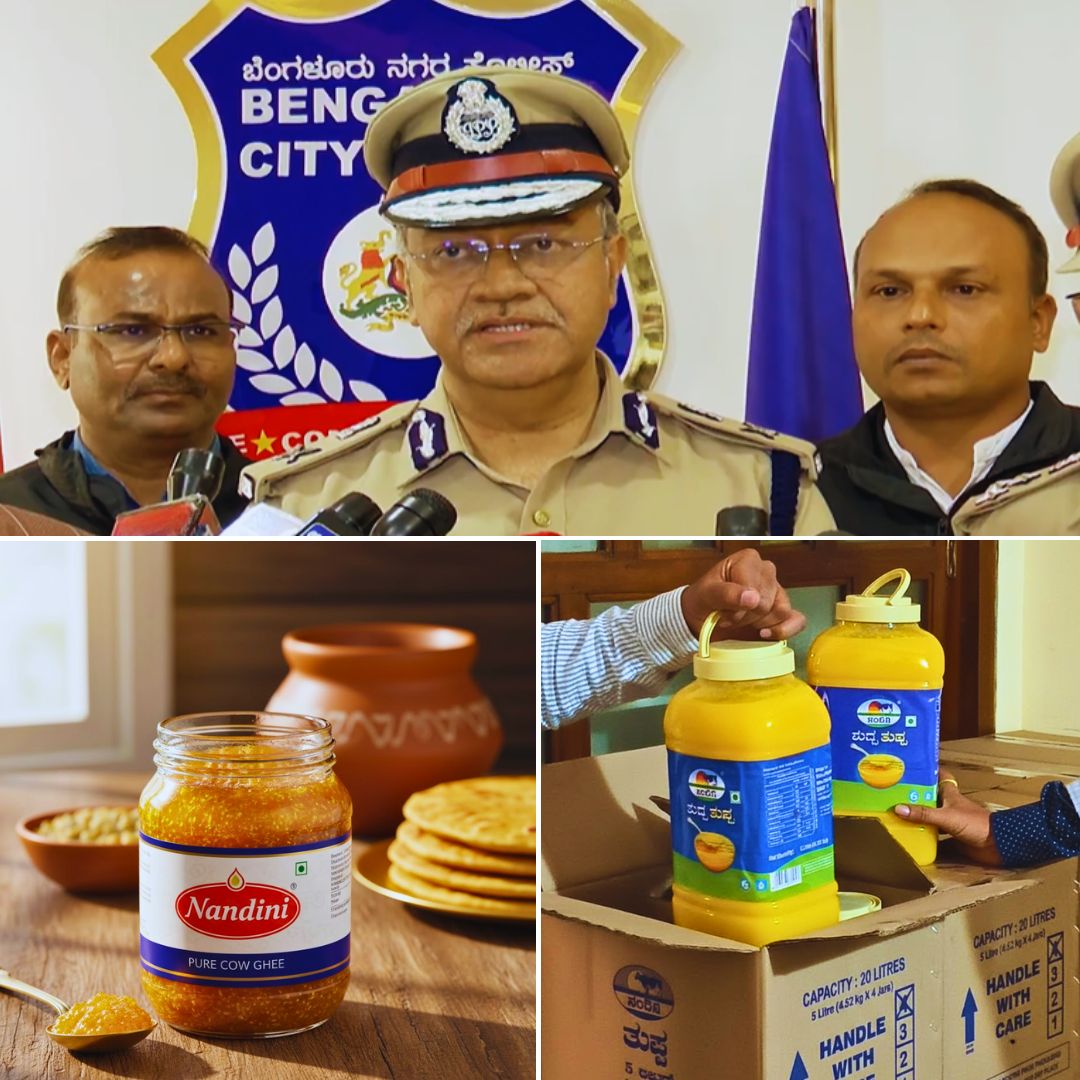In a significant operation on November 14, 2025, Bengaluru’s Central Crime Branch (CCB) and Karnataka Milk Federation (KMF) Vigilance Wing uncovered a large interstate racket producing adulterated ghee under the trusted Nandini brand.
Four accused- including a KMF distributor, his son, a Tamil Nadu supplier, and a driver-were arrested in connection with the scam.
Over 8,136 litres of fake ghee worth Rs 1.27 crore, along with four vehicles used for distribution, machinery, Rs 1.19 lakh in cash, and large quantities of coconut and palm oil used for adulteration, were seized.
The adulterated ghee was made by mixing genuine Nandini ghee with cheaper oils and was sold across Bengaluru city through official and unofficial channels at market price.
Large Adulteration Network Operating Across States
The racket involved sourcing original Nandini ghee in Bengaluru, transporting it to Tiruppur district in Tamil Nadu, and adulterating it by mixing one litre of genuine ghee with nearly four litres of cheaper substances such as coconut oil, palm oil, and dalda (hydrogenated vegetable fat).
The counterfeit ghee was then packed meticulously into fake Nandini sachets and plastic bottles designed to closely resemble the genuine packaging, making it difficult for consumers to distinguish the fraud from the authentic product.
Authorities seized sophisticated machinery and packaging material used for manufacturing the fake ghee, highlighting the scale and professionalism of the network.
Police described how the arrested distributor, Mahendra, who held official KMF licenses, facilitated the distribution process in Bengaluru with help from his son Deepak and associates like Muniraju and driver Abhi Arasu, who transported the adulterated ghee across state lines.
The crackdown followed detailed intelligence gathering by the CCB Special Investigation Squad and KMF Vigilance Wing, which led to raids on Krishna Enterprises premises in Chamarajpet and other linked locations.
Impact on Public Health and Consumer Safety Concerns
Adulteration of dairy products, especially a staple like ghee, poses serious health risks including the possibility of allergic reactions, chronic illnesses, and nutritional deficiencies in consumers. Police investigations have also raised concerns over whether animal fats were used in the fake ghee, amplifying the potential dangers for the public.
KMF Managing Director B Shivaswamy urged consumers to purchase Nandini products only through authorised outlets and stressed the commitment of the federation to safeguard consumer interests.
This racket appears to have been active for at least two years, reviving previously known adulteration practices dating back to 2018, illustrating the persistent vulnerabilities within food supply chains.
The ongoing probe seeks to map the full extent of the network, including other distributors and retail outlets that may have been unknowingly selling counterfeit products.
Measures Against Food Adulteration and Counterfeiting
The exposure of this racket has prompted discussions about strengthening food safety mechanisms in Karnataka and neighbouring states. Authorities are considering the implementation of advanced anti-counterfeiting technologies like QR codes or holograms on packaging to enable consumers to verify product authenticity easily.
The police and KMF continue to carry out surprise raids and testing to root out both producers and sellers of adulterated products.
In addition, awareness campaigns are being planned to educate the public on identifying counterfeit ghee, ranging from changes in texture, smell, packaging irregularities to the importance of buying from authorised dealers.
Consumer safety and transparency remain paramount goals as investigations unfold to bring all involved parties to justice.
The Logical Indian’s Perspective
This alarming breach of public trust through food adulteration threatens the very foundation of consumer health and safety. Food adulteration is not just a crime against individuals but against society’s right to safe, honest products.
The Logical Indian salutes the vigilance and coordinated action of the authorities in unmasking this sophisticated racket and calls for continued emphasis on transparency in food production, empowered consumer awareness, and stronger legal deterrents.
It is only through collective responsibility-from regulators, producers, retailers, and consumers-that such threats can be mitigated.
ಸಿಸಿಬಿ ವಿಶೇಷ ತನಿಖಾ ದಳ, ಕೆಎಂಎಫ್ ನ ನಿಗಾವಣೆ ವಿಭಾಗದೊಂದಿಗಿನ ಜಂಟಿ ಕಾರ್ಯಾಚರಣೆಯಲ್ಲಿ ಈ ತಂಡವು, ₹1.26 ಕೋಟಿ ಮೌಲ್ಯದ 8,136 ಲೀಟರ್ ಕಲಬೆರಕೆ ತುಪ್ಪವನ್ನು, ನಂದಿನಿ ಬ್ರ್ಯಾಂಡ್ನ ನಕಲಿ ಉತ್ಪನ್ನಗಳ ಉತ್ಪಾದನೆಗೆ ಬಳಸುತ್ತಿದ್ದ ವಾಹನಗಳು, ಯಂತ್ರೋಪಕರಣಗಳು ಮತ್ತು ಇತರೆ ಕಚ್ಚಾ ವಸ್ತುಗಳೊಂದಿಗೆ ವಶಪಡಿಸಿಕೊಂಡಿದೆ. ಸದರಿ ಪ್ರಕರಣದಲ್ಲಿ… pic.twitter.com/QBMi2HLM5O
— ಬೆಂಗಳೂರು ನಗರ ಪೊಲೀಸ್ BengaluruCityPolice (@BlrCityPolice) November 15, 2025













